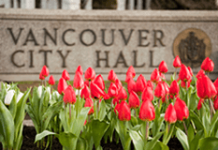Tax could apply to 20,000+ empty and under-occupied homes, unless a principal residence or qualified by exemption

Photo by Chandra Bodalia
VANCOUVER Mayor Gregor Robertson is reminding owners of properties empty at least six (non-consecutive) months of the year to rent their properties by July 1, or risk being subject to the City’s 1% Empty Homes Tax. The Tax – a first of its kind in Canada – aims to put approximately 20,000 empty and under-utilized homes back into the rental market to help lift Vancouver’s rental vacancy rate, which has hovered near zero for years and is putting renters in crisis.
“In a rental housing crisis, it’s unacceptable for so much housing to be treated as a commodity while people who live and work in Vancouver can’t find an affordable and secure place to live,” says Robertson. “Housing is for homes first, investments second. The Empty Homes Tax will help ensure the best use of all our housing, and boost long term rental supply by bringing thousands of homes back into the market.”
Most Vancouver homeowners, including snowbirds, will not be subject to the Empty Homes Tax. Principal residences will not be charged the Empty Homes Tax, nor will properties that are rented long-term (with a tenancy agreement), or for at least 30 days in a row for a minimum of six months in aggregate over the course of a year. There are also many exemptions to the Empty Homes Tax.
Applying a one percent tax in addition to existing property tax aligns with current business property taxes, reinforcing the principle that housing used as a business will be taxed as such – particularly as Vancouver grapples with a housing affordability crisis.
The Empty Homes Tax is one of several measures Council is pursuing to protect and build affordable housing, including:
- Overhauling the City’s housing policy with the Housing Reset;
- Investing $80 million in the 2017 Capital Plan for affordable housing – the most ever;
- Approving a record number of new rental homes;
- Regulating short-term rentals, like Airbnb;
- Pursuing modular housing on city-owned sites;
- Offering 20 sites of City-owned land worth $250 Million to senior governments to use for affordable housing;
- Increasing family home requirements in new housing projects to 35%; and
- Providing four City-owned sites to enable Vancouver’s first Community Land Trust.













